Portsmouth's life-saving animal hospital '“Â behind the scenes
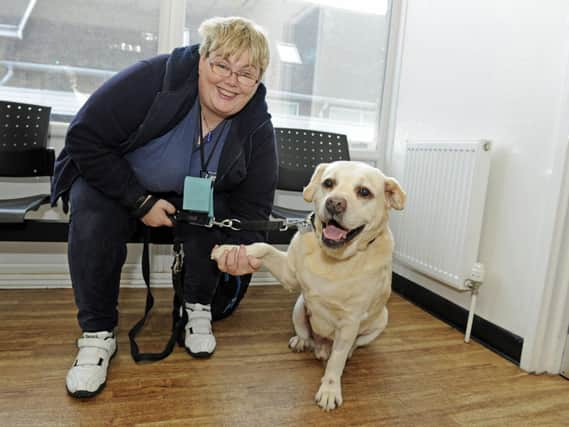

And that rings true with the staff at Portsmouth PDSA Pet Hospital.
From x-rays to life-threatening surgery, life under the knife at the practice in Cowplain, Waterlooville can be a rollercoaster of emotions '“Â for the loving owners, unwell pets and caring staff.
Advertisement
Hide AdAdvertisement
Hide AdThe surgery could be mistaken for a waiting room at Queen Alexandra Hospital.
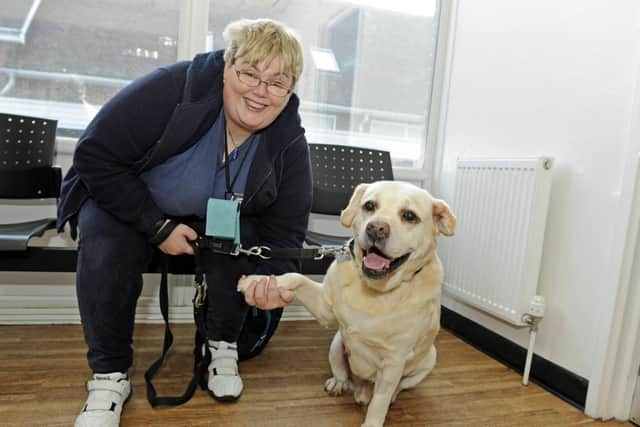

For the only difference is the patients who need care and attention are four-legged, slithering, flying or swimming.
The PDSA is the UK's leading pet charity, providing free and low cost veterinary care for the pets of people in need.Â
'˜Max is my very best friend,' says Natasha Green, smiling as she looks into the eyes of her golden labrador.
Advertisement
Hide AdAdvertisement
Hide AdNatasha and Max, from Bognor Regis, are just one of the many owners and pets waiting to be called into the consultation room at 9am.Â
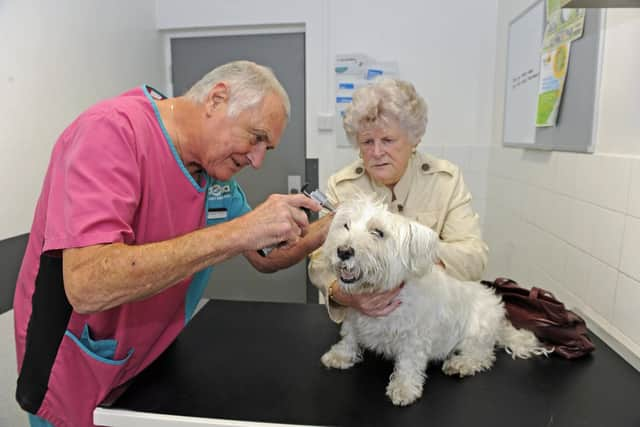

Twelve-year-old Max was diagnosed with kidney disease a few weeks ago.
But this isn't his first trip to the PDSA.
With eczema and ear problems, Max's treatment has been extremely expensive.Â
'˜He's beaten cancer three times '“Â he's a trooper,' Natasha laughs, '˜actually he's stubborn, like me.'
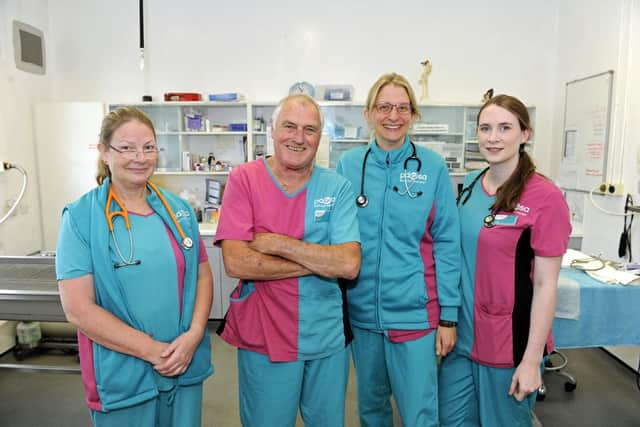

Advertisement
Hide AdAdvertisement
Hide AdAfter spending around £10,000 on Max since she got him six years ago, vet bills were becoming unaffordable for Natasha '“ and that's where the PDSA stepped in.Â
'˜I'm here today because I've had so many scans at the private vets that I have literally run out of money, so I need to find out the next step, she says.Â
'˜Luckily, they have said I can have the medication he needs for free.
'˜But he's worth it,' Natasha squeals, as Max rests his head on her knee.Â
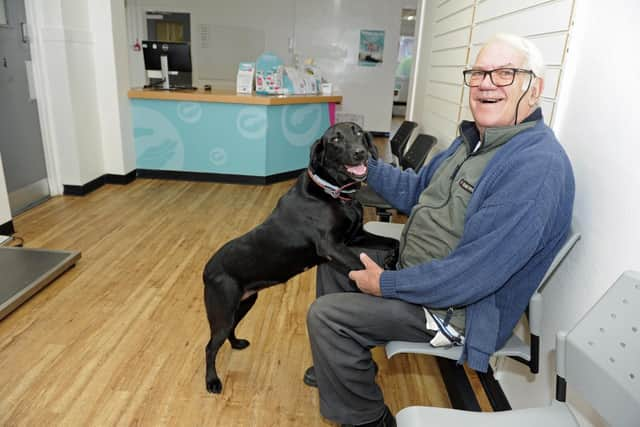

Advertisement
Hide AdAdvertisement
Hide AdNatasha is autistic and says without Max she would be lost in the world.
'˜He helps me out loads. He does everything an assistance dog would do without actually being trained,' she laughs.Â
Although Natasha is a regular visitor to the PDSA, she says she never takes their care for granted.Â
'˜I try not to ask for their help unless I have to,' she explains, '˜but without them, we would be so stuck.'Â
Advertisement
Hide AdAdvertisement
Hide AdProviding free and low-cost care comes at a high price. With no lottery or government funding, it costs more than £60m a year to provide these services.Â
The PDSA only has 48 hospitals across the UK, so people travel far and wide to receive the treatment they need.
With a catchment area spanning from Bognor, in West Sussex, Hampshire, and Haslemere, in Surrey, the hospital is always full.Â
George and Dorothy Wright, from Bosham, arrive with Bertie the shih tzu for ear canal treatment.Â
Advertisement
Hide AdAdvertisement
Hide Ad'˜We have to travel to get the care, says George, 78, '˜but we don't know where we would be without it.'
'˜I love him so much,' says Dorothy, '˜I would rather go without than Bertie.'Â
Among the soft purrs, nervous barks and comforting murmurs, there's a deep sense of gratitude within the waiting room.
Sitting with her West Highland terrier at her feet, Doreen Rhodes is waiting to hear what is in store for her and Mac.Â
Advertisement
Hide AdAdvertisement
Hide Ad'˜I rescued Mac three years ago '“Â he's a great little pup.
'˜I used to go to a private vets but since I lost my husband, me and Mac have been coming here. They're absolutely brilliant,' she says.Â
For head vet Emily Sharp, her job at the PDSA provides her with a great sense of achievement.Â
Born and raised in Portsmouth, the 28-year-old returned to the PDSA after training in Liverpool and working in private surgeries.Â
Advertisement
Hide AdAdvertisement
Hide Ad'˜I came back after working private for sheer job satisfaction really,' Emily explains.Â
'˜There's something incredibly rewarding knowing that you are helping those pets that, without the organisation, might not be able to access treatment.'
Emily explains her role during an interval between back-to-back surgeries, before she excuses herself for five minutes to vaccinate a cat.
'˜Our day-to-day life is definitely high pressure,' she laughs on her return, '˜anything could walk through the door.
Advertisement
Hide AdAdvertisement
Hide Ad'˜Just the other day, we had a dog rushed through the doors that was going blue and choking. It had a ball stuck in its throat.
'˜It was all hands on deck '“Â whichever vet was available dealt with the situation immediately.
'˜Our vet Jack retrieved the ball quickly and the dog survived. Job done,'Â she smiles.Â
From coughing cats to torn ligaments, life in an operating theatre is intense.Â
Advertisement
Hide AdAdvertisement
Hide Ad'˜You will operate on about six animals a day. And that includes anything from removing lumps to doing abdominal surgery, after a pet has eaten something they shouldn't.
'˜Not only are you dealing with the animals, but the owners too.
'˜Most of them can be very anxious so there's a lot of emotion tied up into each case you deal with,' she explains. Â
But when Emily leaves work each day she feels completely fulfilled. Â
'˜The PDSA is a fantastic thing to be a part of.
Advertisement
Hide AdAdvertisement
Hide Ad'˜The fact is if this organisation was not here, there would be a massive subset of owners and animals that wouldn't access treatment,' says Emily.
'˜It's very rewarding knowing we can change that for them.'
n For more information go to pdsa.org.uk.Â
History of Portsmouth PDSA
From the first basic dispensary in London's Whitechapel, which opened in November 1917, Maria Dickin took PDSA to other towns and cities by horse-drawn ambulance.Â
The first mention of a PDSA site in Portsmouth was in Ordnance Row, Portsea, which was opened in 1925 following a generous gift.
In 1928, a second dispensary was opened in Queens Road, Buckland, and then in 1931, a further dispensary was opened in London Avenue, North End.
Advertisement
Hide AdAdvertisement
Hide AdIn 1948, PDSA moved to a new dispensary at New Road, Portsea, but by 1950, there was mention of a brand-new purpose-built site in Durnley Avenue, Cowplain, which is where the hospital still stands.
It was designed to service the animals of Hampshire and Essex.
In 1972 the Cowplain site was refurbished and modernised and by 1974, the caseload was 32,680.
For a short time, PDSA acquired a smaller site at Fawcett Road, Southsea, but the centre quickly became too small to meet demand in the area and in 1988 the service was moved to a larger site in Middle Street, which remained open until 2016.
Advertisement
Hide AdAdvertisement
Hide AdMeanwhile, in 1980 alterations were also carried out at the Cowplain site, which remains the main base for PDSA in the area.
PDSA's most recent figures show that Portsmouth PDSA Pet Hospital provides around 65,000 treatments annually, and can see as many as 180 pets in a single day.
It costs around £1m a year to run PDSA's services in Portsmouth, all funded by generous public support.
Donate at PDSA.org.uk.
Â